The insider’s scoop on liveness verification
How we differentiate between you and the imposters.
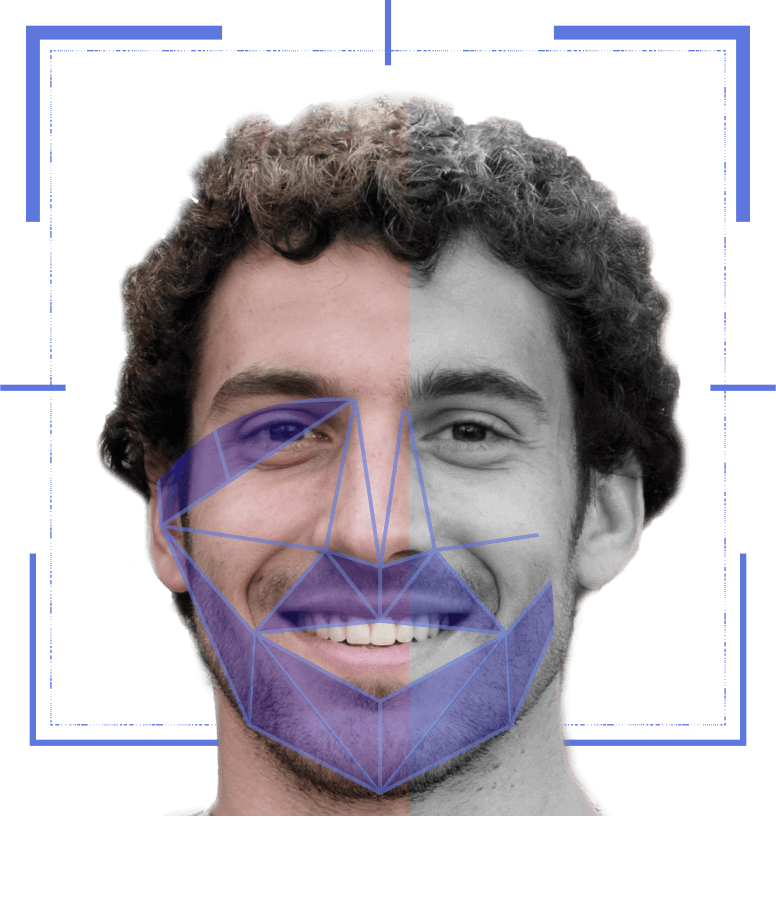
Daniyal Chughtai
CTO Facia

Fun Fact: This photo of mine is AI-Generated.
The world finds a saviour in Facia; a liveness verification solution that puts all the spoofing attempts in the world to a shame. Absolutely zero tolerance for any mystery looking fraudsters, ensuring only genuine users gain access to the system - always and everytime.
We stop fraudsters, not customers.
Getting Basics Right
skip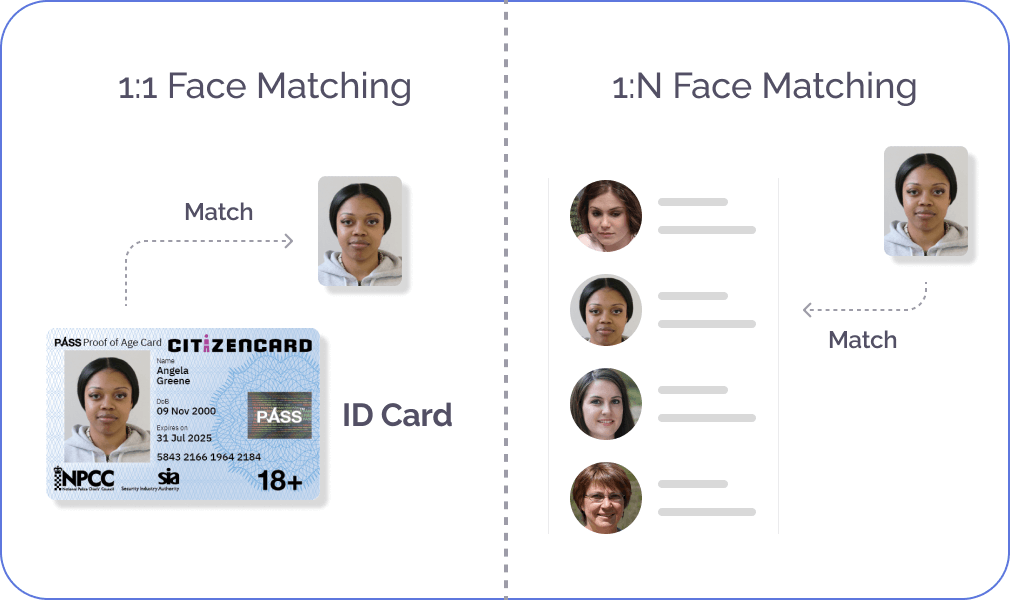
What is Face Matching/ Face Recognition?
A facial recognition system is a technology potentially capable of matching a human face from a digital image or a video frame against a database of faces.
What is Liveness?
Liveness check is the ability of an AI system to identify if it is interacting with a real-world human or not.
In face biometrics, liveness is used to verify if a human being is physically present in front of a camera or if is being presented a spoof, i.e., printed photo, 3D mask, screen presentation, etc.
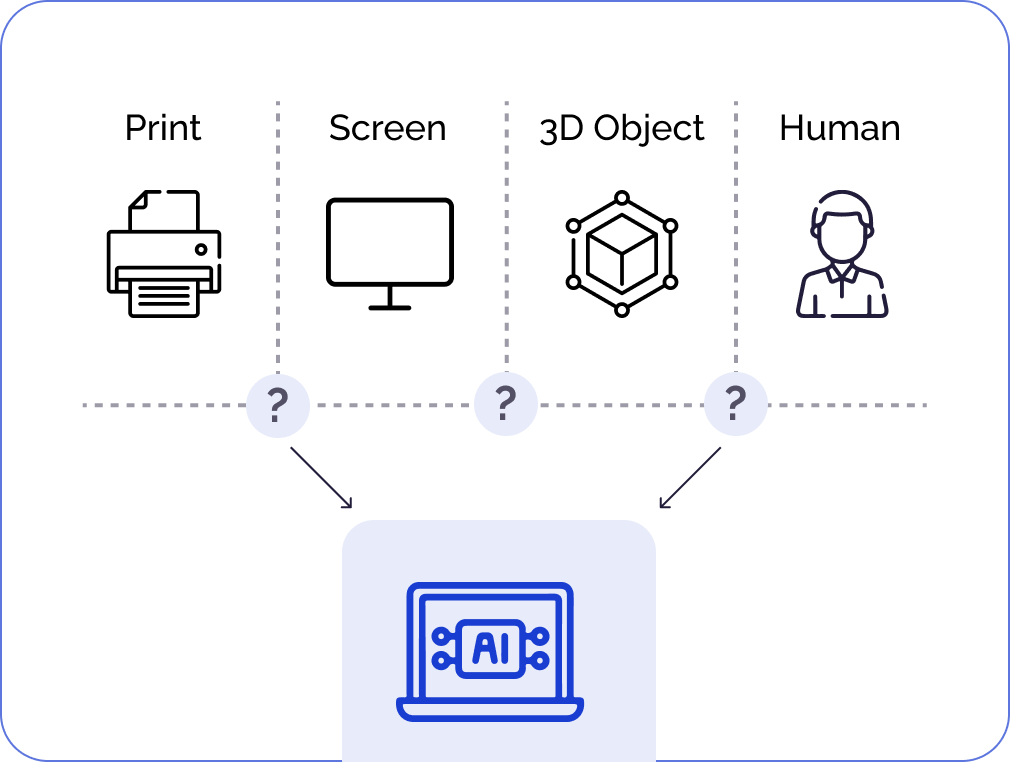
Key Terms:
False Accept Rate (FAR)
A measure of how many imposters/unauthorized users were let in by the system erroneously.
False Reject Rate (FRR)
A measure of how many legitimate users were rejected or asked to try the liveness check again.
True Accept Rate (TAR)
A measure of how many authorized users were successfully approved by the system.
True Reject Rate (TRR)
A measure of how many imposters/unauthorized users were successfully refused by the system.
Key Industry Challenge
How do we gate keep the imposters while letting in authorized users always and everytime?

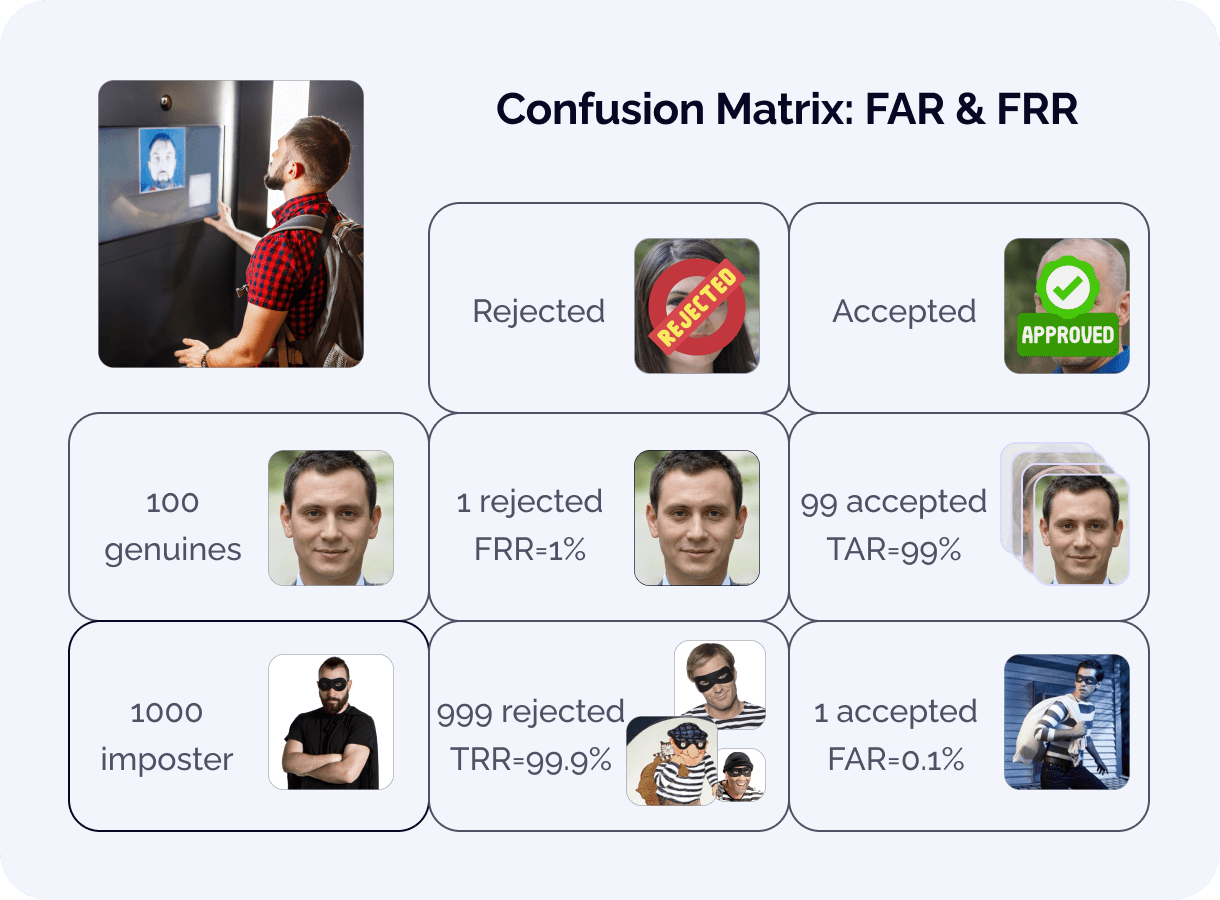
Issues with liveness checks
The industry is still perplexed with the challenge of balancing FAR and FRR. Most vendors and technology-buyers consider it a trade-off between the two and adjust thresholds as per the use case requirements.
The tradeoffs are between security and accessibility.
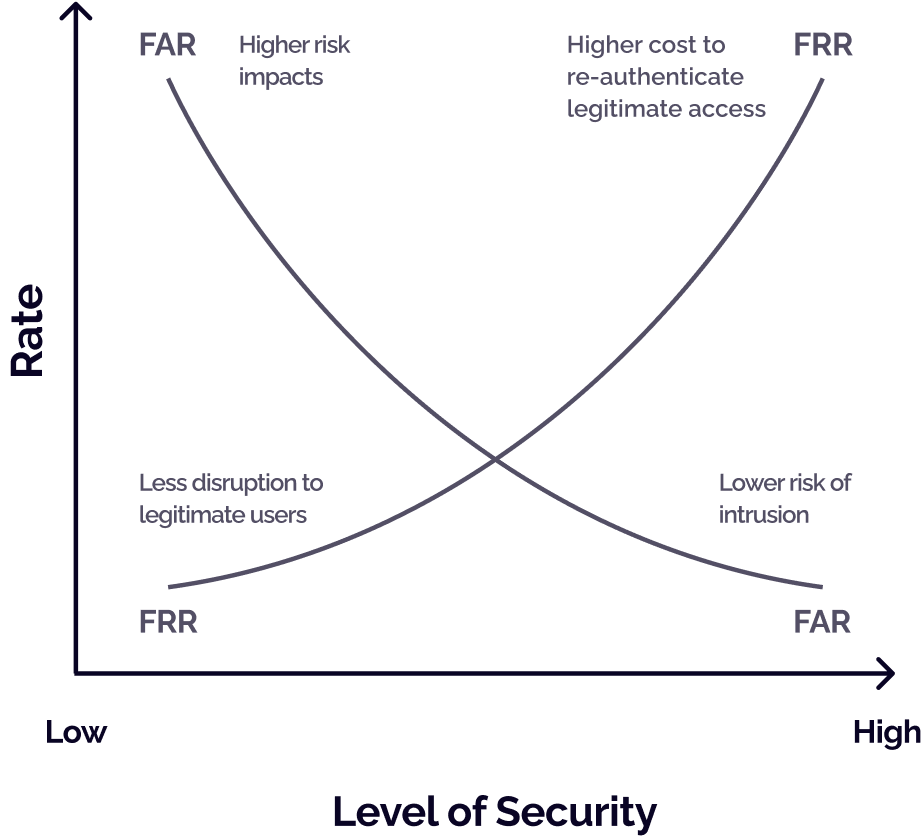
"High security" systems will make it challenging for impostors to gain entry, resulting in a low False Acceptance Rate (FAR). However, it will also pose difficulties for genuine users, leading to a high False Rejection Rate (FRR). On the flip side, a lenient system with a low threshold will almost never deny access to genuine users, but also the imposters!
How thresholds are set for FAR and FRR
Thresholds for FAR and FRR are set as per the user case requirements. Critical use-case businesses need a high FAR threshold while compromising on the user experiences whereas non-critical use cases prioritize user convenience.
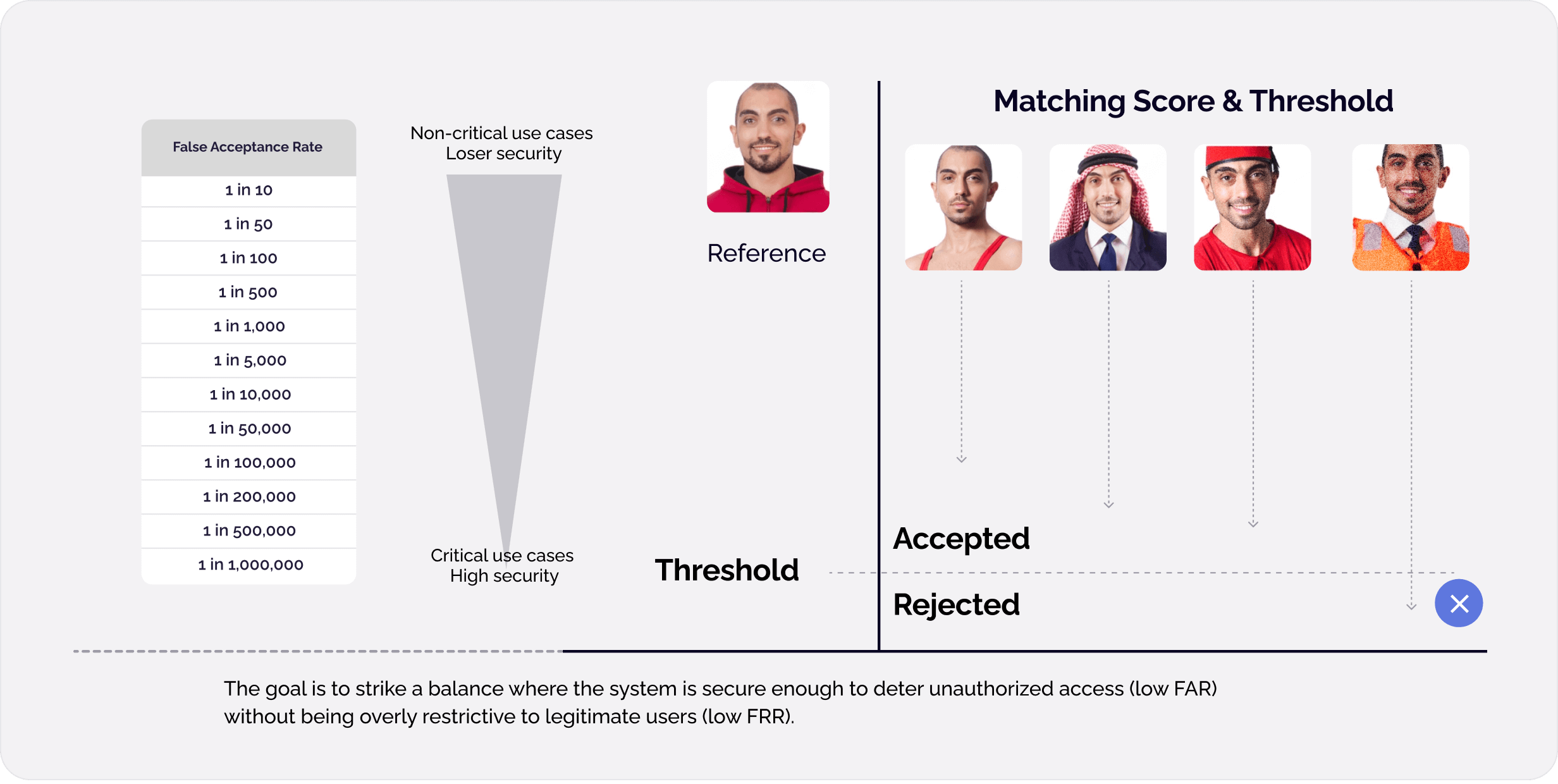
Adding ‘time’ to the complexity
Time required per liveness check is the major concern for face biometric technology buyers. Most vendors provide similar offerings while traversing across the same trade off between FAR/FRR. The more time they engage a user for, the better they get in spoof detection, but the higher the verification inconvenience to the end-user.
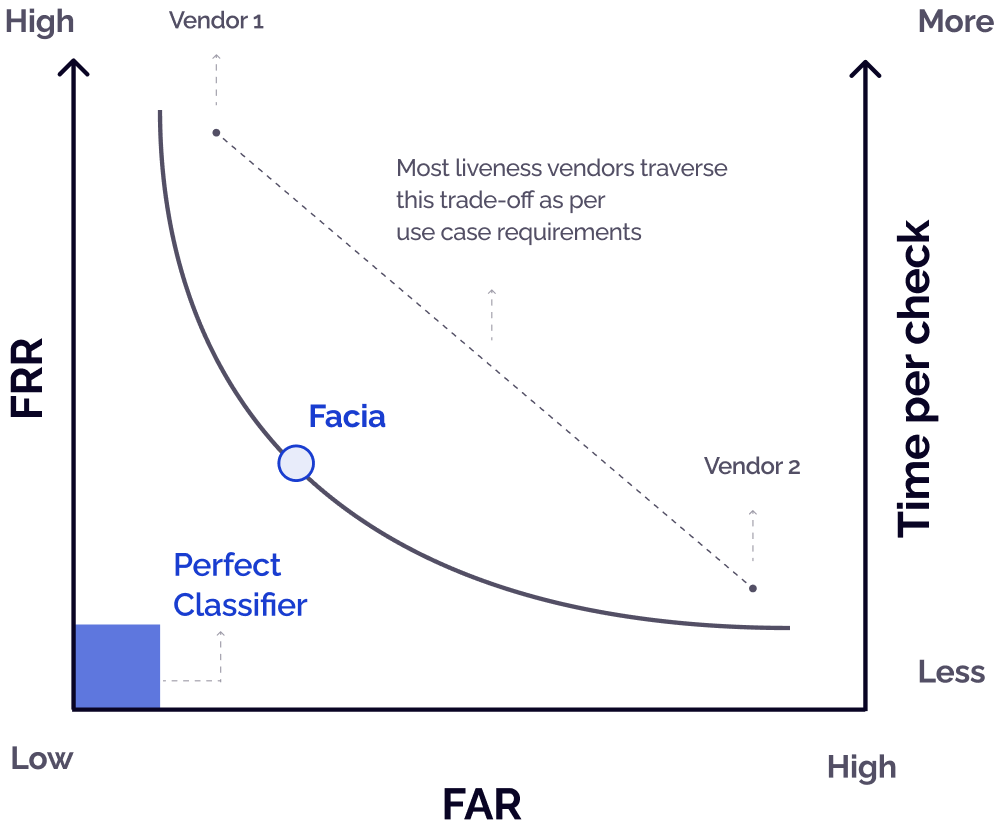
Facia’s Innovation
A perfect classifier is the one that has a non-existent FAR and FRR while providing that result in under a second. Facia’s proprietary algorithm lies closest to it giving the most seamless verification experience to end users while reducing churn for clients.
FRR - Why does it occur?
Many vendors report their FRR under ‘ideal conditions’. However, real-world usage is always far from the ideal cases resulting in many false rejections in cases of low-lighting, face accessories, legacy device, etc.
Clients only realize this once they start measuring the lost value due to churned customers.
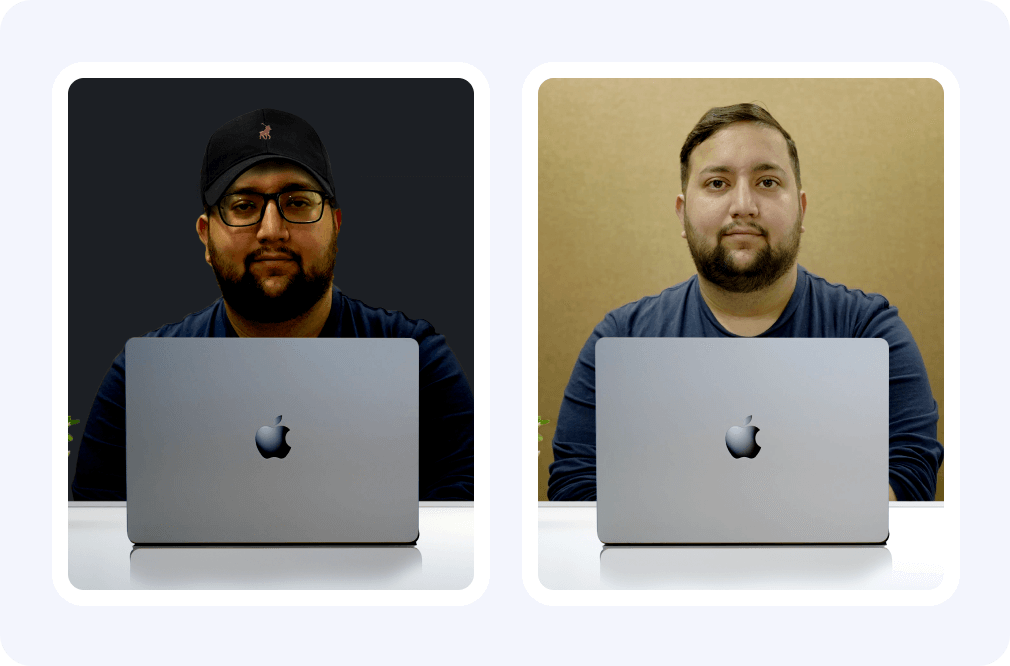
See How Facia Overcomes it
- Senior Citizens | Head Accessories
- Legacy Devices | Light and Background
- All Skin tones/Proof of Concept
Senior Citizens
The age factor may cause operating difficulties in passing verification journeys. Furthermore, their face matching with Identity Documents is more susceptible to FRR.
Face Accessories
A user might be wearing different accessories, like a hat, hoodie, glasses, scarf, or even makeup. Facia does not require them to take off anything and never generates a False Rejection.
Legacy Devices
Not all users enjoy the liberty of having the latest phone or laptop. Facia is trained on images from cameras of all legacy devices to never falsely reject a user due to slightly blur image.
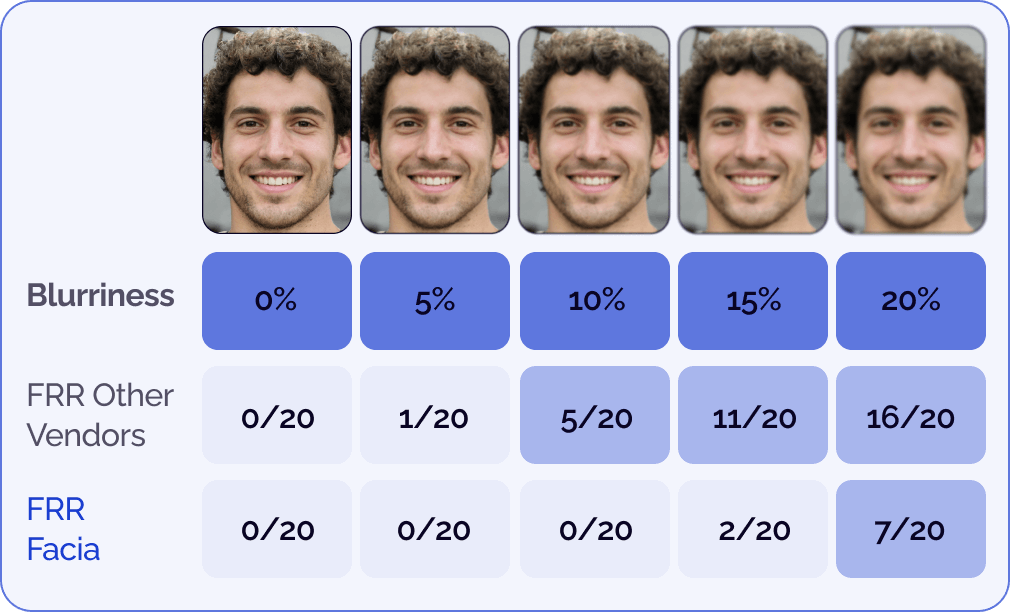
Lighting and Backgrounds (Video)
Different vendors ask you for a white background, but Facia allows you the comfort of staying in the same place. Whether it is out in the sun, in your bedroom, or your office place. Facia works perfectly.
Algorithm Bias
Facial biometric softwares are prone to ethnic bias in their systems as they are trained on datasets of white people however Facia is trained on diverse datasets.
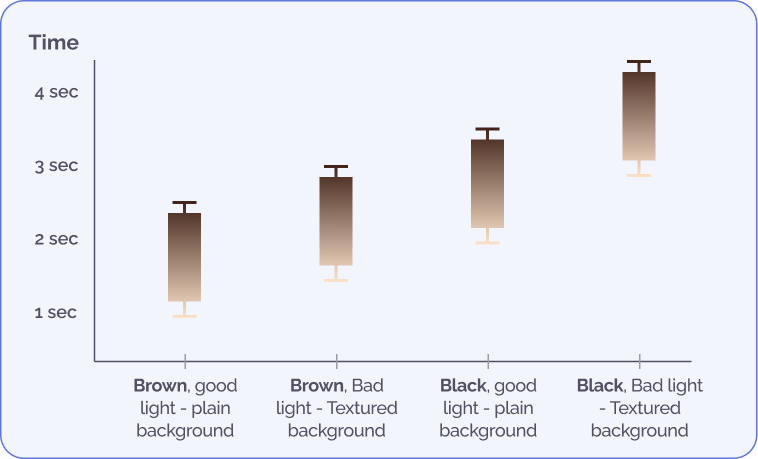
Internet Speed
Softwares that require a high network payload from users result in incomplete journeys since not all users have consistent high internet speed.
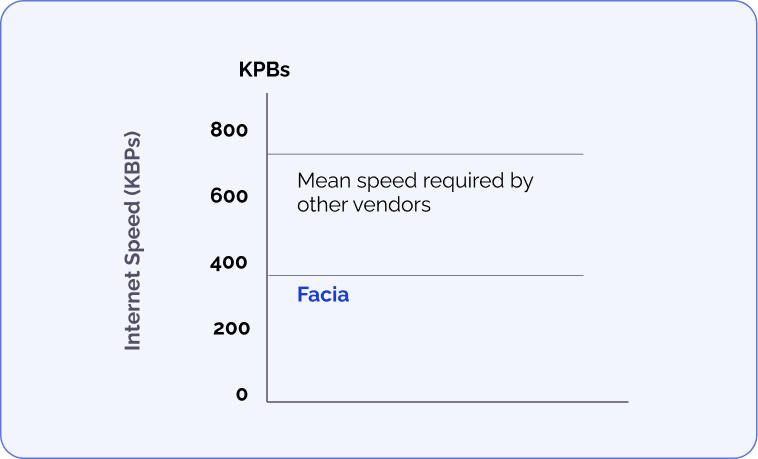
Journey Completion Rate
Clients face huge customers churn on their verification journeys due to extensive demands from users to complete a liveness check. However, Facia swiftly verifies a user under a second without any alterations in a users’ setting.
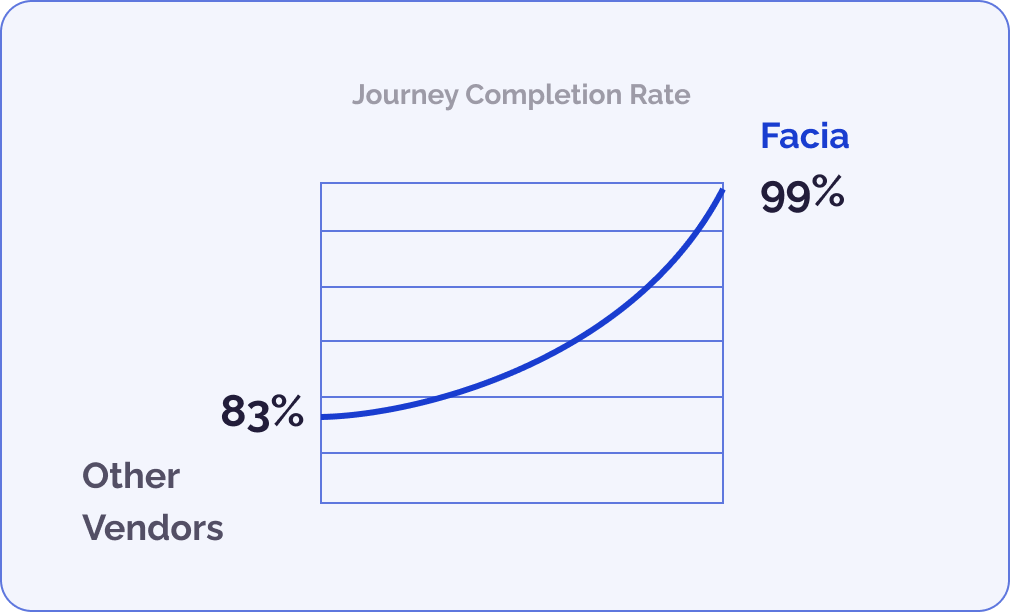
Proof of Concept
Experience our full-featured proof-of-concept as Facia is the only facial recognition & liveness detection vendor offering a custom engineered free product experience for your exact use case.
 Engineering Hours
Engineering Hours No Commitment
No Commitment No Cost To You
No Cost To You- Try Now
FAR - A thing of past
NIST’s recent study revealed Presentation Attack Type 1: Still Media: the BEST 2D Liveness Algo allowed 6.9% of spoofs to pass. Facia's iBeta level 1 testing reported an FAR of 1/100 million, while Facia is iBeta level 2 compliant now as well.
Facia’s innovation is that it performs a complete liveness check in under a second.
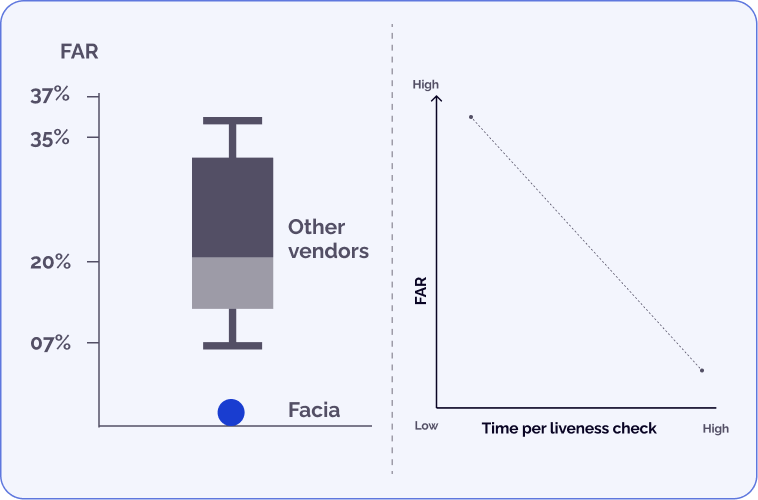
See How Facia Overcomes it
2D Attacks
Approaching near zero FAR against all types of 2D attacks such as print attacks using photos, flat paper, etc with checks performed in under a second.
3D Attacks
Evolving methods of spoofing such as hyper realistic silicon masks, are catered with full-precision and promise of one second liveness checks.
Deepfake Attacks
Experience the sharp rise but quick fall of deepfake attacks with Facia. Our tested and proved 1/100M FAR never lets a spoof attempt through.
Proof of Concept
Experience our full-featured proof-of-concept as Facia is the only facial recognition & liveness detection vendor offering a custom engineered free product experience for your exact use case.
 Engineering Hours
Engineering Hours No Commitment
No Commitment No Cost To You
No Cost To You- Try Now
Facia - A Software You Can Trust
iBeta Level 2 compliant provides a rigorous evaluation of a biometric system's liveness detection capabilities. This advanced testing goes beyond basic attacks to simulate sophisticated attempts that could potentially bypass less robust systems.
The testing process for iBeta Level 2 is complex and requires expertise in both Presentation Attack Detection (PAD) and security principles. By achieving iBeta Level 2 compliant, developers and providers demonstrate their commitment to high-security biometric solutions. This certification provides peace of mind to users and organizations relying on biometrics for critical authentication tasks.
| Feature | iBeta Level 1 | iBeta Level 2 |
|---|---|---|
| Testing Duration | 8 hours per subject/species | 2-4 days per subject/species (can be longer) |
| Attack Sophistication | Low | Moderate to High |
| Attack Examples | - High-resolution digital photos | - Realistic dolls (various materials) |
| - Paper photos | - 3D masks (high-quality, custom-made) | |
| - High-definition challenge/response videos | - Digitally synthesized faces (deepfakes) | |
| - Replay attacks (pre-recorded videos) | - Re-enactment attacks (imposter mimicking user) | |
| Number of Attacks | 135 Presentation Attacks (PAs) per subject/species | 1000+ PAs per subject/species (varies) |
| Environmental Conditions | Not explicitly controlled | May involve variations in lighting, background noise, and user position |
| Artefact Source | Readily available (home/office) | Requires specialized equipment, fabrication skills, or access to deepfake creation tools |
| Pass/Fail Criteria | 0% Presentation Attack Detection (PAD) failure rate | Upto 1% PAD failure rate |
| Reporting | Basic report with attack success rates | Detailed report with analysis of attack types, success rates, and potential vulnerabilities |
Facial biometric ‘spoofing’ challenges were from Yesterday
A bigger challenge today comes from synthetically generated imagery (AI) digitally injected into data streams to create false media which is indistinguishable from an real identity or real source. Since the spoof is digitally injected, none of the algorithms are effectively ‘applied’ on it.
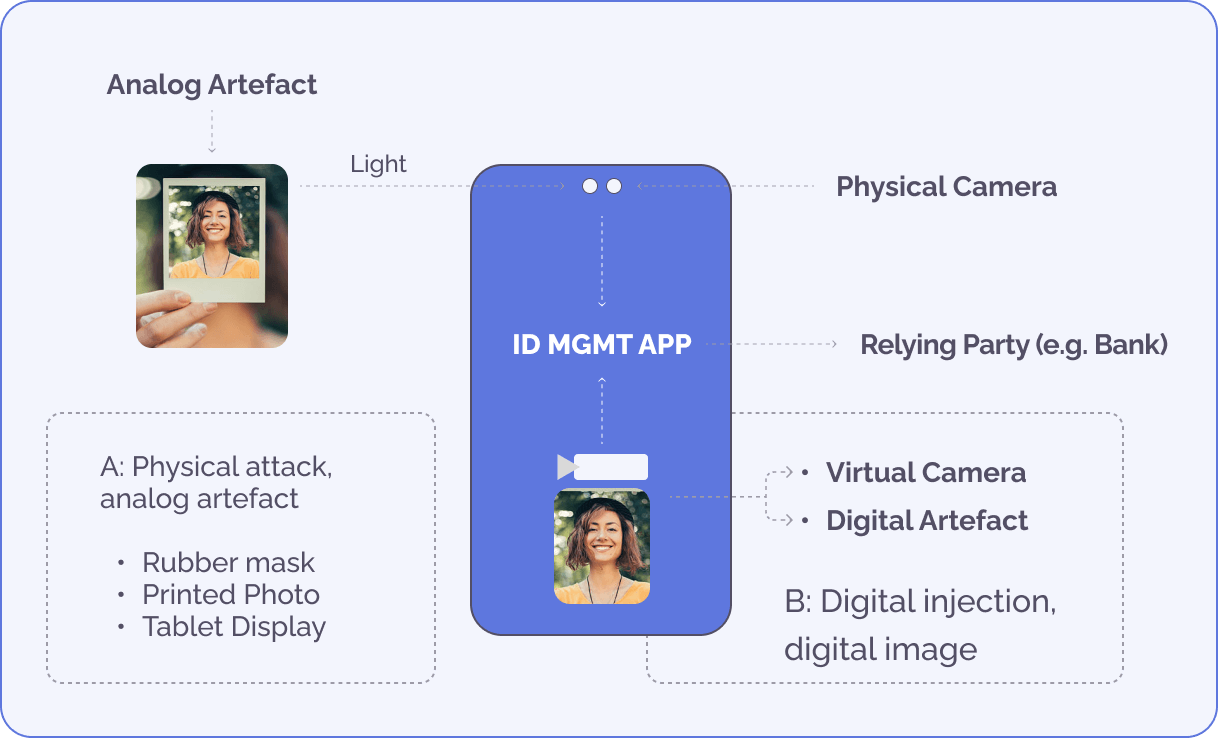
Client Side Liveness Checks
Server-side liveness checks are much more vulnerable to deepfake attacks, as this form of liveness lacks the ability to secure the camera feed of the user. This means that an attacker can ‘inject’ videos into the authentication system, thus completely bypassing the security mechanism. The only way to effectively fight against a deepfake injection attack is an SDK running on the user’s device itself! The SDK would secure the user’s camera feed, making sure that no external video stream is able to be inserted. This is known as a ‘client-side’ liveness solution. It is however important to remember that even these kinds of liveness solutions have limitations. Preventing video injection attacks in authentication systems thus remains a significantly complicated task, and unfortunately, currently existing industry standards, like iBeta certifications, do not account for them at all.

Complete OS Coverage
Addresses threats on desktops and mobile devices with coverage on iOS, Android, Windows, and Mac.

Architecture Flexibility
Prevent most critical attack types including virtual cameras and browser JavaScript modifications

Broad Protection
Prevent most critical attack types including virtual cameras and browser JavaScript modifications

Frictionless Experience
The techniques requires no interaction whatsoever with the user and adds no friction to the user experience.
Facia’s Innovation
Single Image Liveness
Facia considers true passive liveness only when the single image captured for face matching is used to determine liveness as well, eliminating the cost of processing videos and removing the added user friction.
Facia is at the forefront of innovating single image liveness which will reduce all sources of friction and redeem lost revenue for our clients.

User takes a selfie

Selfie image is used by the facial recognition system to determine a match

The same selfie image is used for the liveness check

Proprietary algorithms analyze the image for liveness

The system returns a liveness score

Return on Investment with Facia
We’re so confident you’ll do better with Facia, we made a whole calculator for you to see just how much better.
Verification Costs
NaN
Your current
verification bill
NaN
Your estimated cost with Facia
Direct savings
Opportunity Costs
NaN
Users that left
NaN
Increase in Revenue from new users
Savings from fraud incidents
Increased Implicit earnings
Estimated total value created from switching to Facia*
*The Facia Value and Growth Calculator is designed to provide an estimate of potential savings and benefits when using Facia’s products and services as compared to other solutions in the market. The information provided is entirely voluntary and in providing it, it is assumed that whomever provides such information has the right to do so. The results presented by this calculator are based on the inputs provided by the user and are for illustrative and informational purposes only.
Ready to Counter Identity Spoofing Forever?
Use Facia to fight against Deepfake. We’re here to stop spoofing and help you save money. Save yourself from attacks and make sure you’re always 10 steps ahead.



